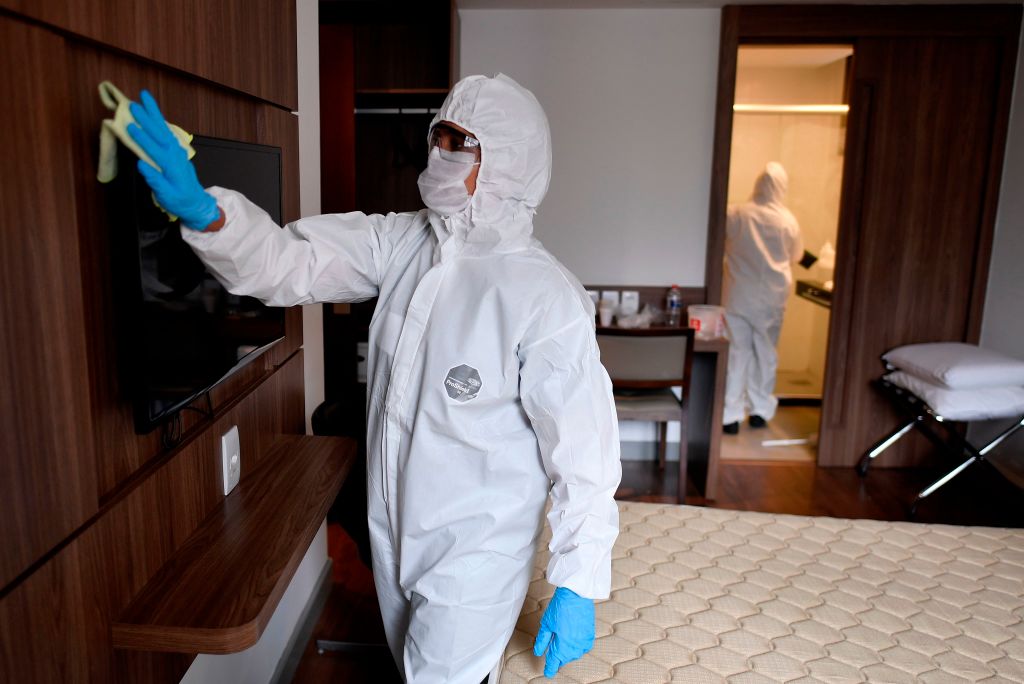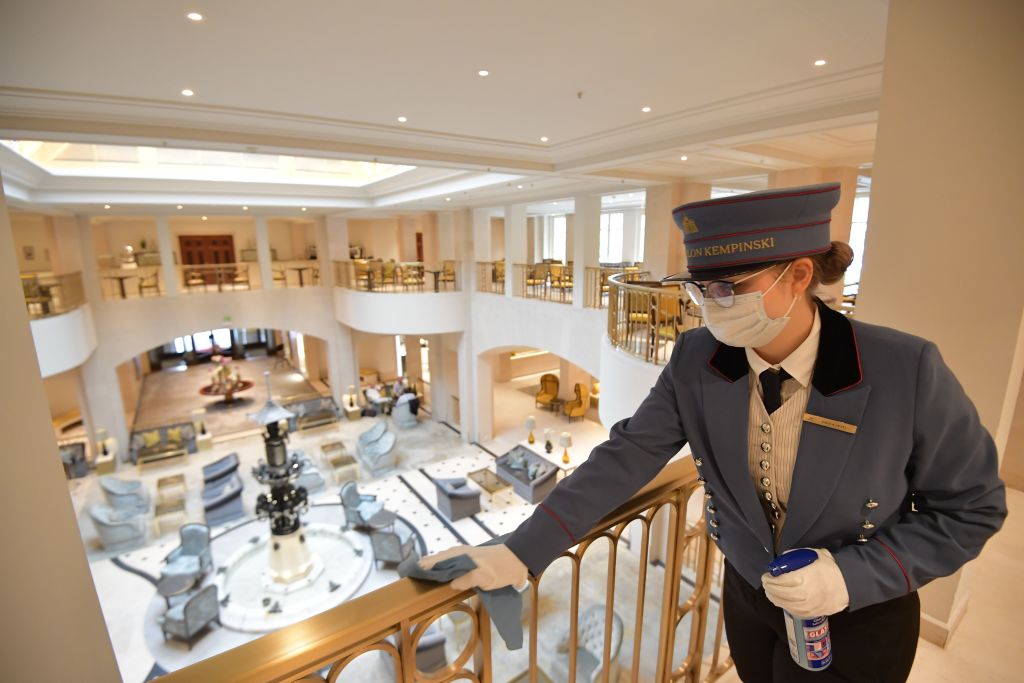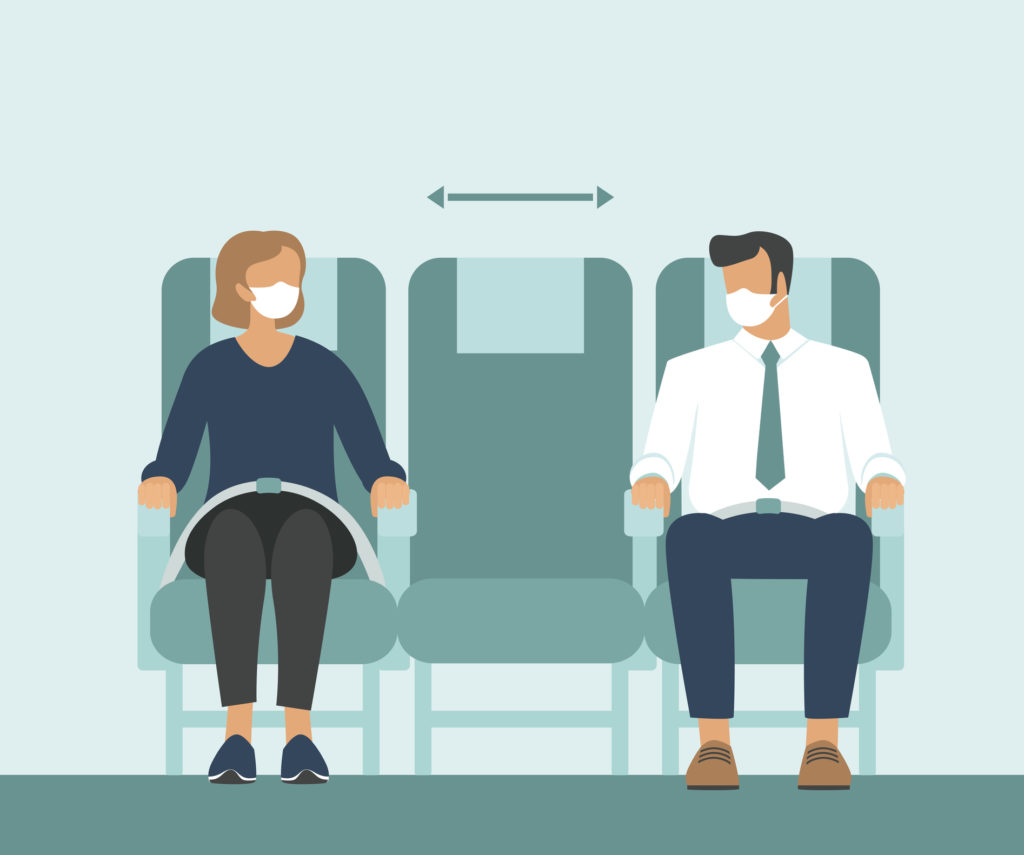How to stay safe from COVID-19 in a hotel this fall
Signing up for credit cards through partner links earns us a commission. Terms apply to the offers listed on this page. Here’s our full advertising policy: How we make money.
As summer slowly fades to fall, it’s hard for many to believe that the COVID-19 pandemic is still active with full force. There are currently more than 25.2 million cases worldwide, and in the U.S., the pandemic is to blame for nearly 6 million infections and more than 182,000 deaths.
COVID-19 has become a new normal, and as some schools slowly reopen and Americans return to work, travel is once again on the docket for many. A recent survey from Azurite Consulting, a financial data and research firm in New Jersey, found that 67% of Americans will still stay in a hotel without a coronavirus vaccine. Of those at a higher risk, 53% say they will stay in a hotel for leisure.
In this time of crisis, The Centers for Disease Control and Prevention (CDC) is the leading coronavirus authority, advising Americans on all of the latest precautions on ways to protect against the virus. While the CDC recommends that you stay at home as much as possible, there are times when you may have no choice but to board that plane despite worries of if you can fly safely.
When it comes time to lay down your head, what can you do to keep yourself safe from the coronavirus?
It is possible to stay safe from COVID-19 while traveling this fall if you follow our expert tips.

How coronavirus is spread
The Coronavirus, more specifically COVID-19, is a respiratory illness that is spread through droplets in your saliva or mucus. When you cough, sneeze, talk, sing or shout, you spread tons of these droplets into the air where they look for somewhere new to land. You don’t want to be that place.
Symptoms of coronavirus include:
- Fever or chills
- Cough, shortness of breath or difficulty breathing
- Fatigue
- Muscle or body aches
- Headaches
- New loss of taste or smell
- Sore throat
- Congestion or runny nose
- Nausea or vomiting
- Diarrhea
One of the most dangerous parts of this illness is how long it can survive on surfaces. COVID-19 can last on paper and cardboard for up to 24 hours, but on other surfaces, like metal, stainless steel and plastic, it can live for much longer, up to 3 days even.
With so much turnover in hotels, combined with employee shortages and sickness, it is more important than ever to take every precaution to keep yourself safe during your travels. Hotels are doing their part, too, with many changes to better protect you.
The hotel experience during a pandemic
There are many changes that hotels are instituting to maintain higher health and cleanliness standards.
These are some of the changes hotels are taking to better protect you from coronavirus.
Signs — These help instruct guests of hotel policy towards COVID-19 precautions.
Sterilization centers — These centers are being added throughout the main hotel areas for easy access.
Contactless services — To minimize contact, many hotels are instead offering kiosk, mobile and online check-in and check-out.
Mandatory face masks — These are required in all public areas, except when eating or drinking. Some hotels will even provide face masks for those who do not have them.

Suspended amenities — To help you maintain social distancing, many amenities have been suspended. Although pools remain open at most hotels, business centers, gyms and saunas are often closed.
No room service — Many hotels have decided to forego room service to limit contact, so it’s usually best to get your orders through a contactless delivery service for maximum protection. Otherwise, you can go to the hotel restaurant for a bite, but don’t forget your mask.
Many hotels have had to make significant changes to the layout of their hotels to accommodate these new measures for social distancing. These changes may constitute a new normal going forward.
“According to expert professionals, all the elements and spaces will be designed with minimum human contact and will drive guests to enjoy the spaces just through the visual sense,” says Jennifer Willy, Editor of Etia.com. “It is very likely that we will see a similar shift to disinfection as a new normal while allowing guests and staff into hotel buildings. In such a scenario, zero-maintenance buildings, touch-free interactions, and technology-based sanitization will evolve as a new normal for hotels across the globe.”
Leading hotel COVID-19 precaution
While hotel chains roll out travel incentives on hotel credit cards, they’re also adding extra precautions during your stay to better protect against the coronavirus.
“The major hotel chains are taking different but like-minded approaches — with stringent cleaning protocols, face coverings, touchless entries, and many standard amenities being restricted,” explains Phil Harper. A Certified Infection Prevention Expert, he is also the owner of Wellnest, LLC, a Washington, D.C. commercial cleaning company.
He cites Hilton’s partnership with Lysol through its Cleanstay Program and Marriott’s Cleanliness Council as examples of these new initiatives.
Below are some of the new changes that you will see at these popular hotel chains.
Universal Orlando Resorts
Several new changes include mandatory face masks, floor markings for six-foot distancing, limited hotel capacities and heightened staff management and training protocols with increased touchless and mobile services. There are also temperature checks (anyone with 100.4 degrees or more cannot enter), and applying hand sanitizer is required at certain locations, such as before boarding any vehicles.
Hyatt
Hyatt has introduced its Global Care & Cleanliness Commitment which includes enhanced cleaning protocols and training. It’s also introduced flexible travel policies, allowing for extended cancellation for existing reservations prior to July 1, 2020, and free cancellation for all trips scheduled thereafter. The hotel chain is also extending World of Hyatt elite benefits beyond its typical year-end expiration. Exhale spas remain closed at this time, and all FIND experiences are postponed indefinitely.
Wyndham Hotels & Resorts
The Count on UsSM initiative is being enforced at all Wyndham American and Canadian hotels. This includes extra precautions through its vendor EcoLab for EPA-approved disinfectants and sanitizers. There is also additional training, heightened cleaning protocols and new flexible cancellation policies, including no fees for those whose travel is prevented by government mandate. Masks are required on the premises, and the staff offers disinfectant wipes with your keycard at check-in.
Choice Hotels
This hotel chain includes extra cleaning protocols, in addition to “on-demand” housekeeping service to minimize the spread of COVID-19. You will notice new furniture arrangements to allow for social distancing and a change in the breakfast menu that provides pre-packaged items in lieu of a buffet. Choice Hotels also work closely with EcoLab and have a “Commitment to Clean“ program with its own leader appointed at each hotel.
Best Western
Through its We Care CleanSM program, Best Western offers a mobile concierge service, social distancing floor decals, sanitizing stations, a new breakfast menu with more “Grab & Go” items, and removal of unneeded items like decorative pillows and papers. The hotel also says it leaves rooms untouched as much as possible for 24-72 hours after housekeeping service.
How do you stay safe while traveling to hotels during COVID-19?
While hotels are increasing their safety and cleaning protocols, there are some things you can do to ensure your safety and protect your health while you are traveling.
Consider your destination
Many countries are under severe travel advisories, and the last thing you want is to make all of your plans and reservations only to find out that you are barred from entry. With the U.S. among the countries hardest hit by COVID, it’s crucial that you continue monitoring travel advisories and developments all the way up until your trip. Make sure to book a hotel that provides a flexible change and cancellation policy.
You will also want to ensure that you practice social distancing on the plane and pick the safest seat to lower your chances of arriving at your hotel already infected.

Do your research
Before making any reservations, ask what the hotel is doing to protect staff and guests from coronavirus. Find out if there is a doctor on the premises and what the hotel is doing to help guests who become ill on the property.
“Independent boutiques’ [cleaning policies] will vary by hotel, but [they] should have everything listed on their website,” advises Harper. “If they don’t, stay away.”
Ask for a room that has been vacant
Given how long coronavirus can exist on surfaces, it’s best that hotels space out their guests’ stays as much as possible. With COVID-19 living on some surfaces up to three days, it is important to give the virus time to die off.
“When preparing to travel, ask for a room that’s been empty for at least 24 hours,” says Harper.
Limit contact
Thanks to the digital age, it’s easier than ever to eliminate human contact at hotels with the help of tools like online reservations and mobile check in and check out. Some hotels also offer concierge kiosks, but it’s best to use your own online and mobile resources as much as possible.
It’s important to limit interactions with all the people you can. Coronavirus symptoms may lay dormant or not show at all, so it’s crucial that you follow local mandates and maintain social distancing at all times.
Avoid elevators if possible
Elevators are small, confined spaces that allow for the easy spread of germs. Requesting a room on the ground floor or a lower floor can help you avoid the elevator altogether, but if you must use an elevator, try to use empty or near-empty elevators as much as possible.
Sanitize your room
While most hotels are being diligent about COVID cleaning measures, mistakes happen, and germs could be left behind. Using an approved disinfectant, wipe down high-traffic areas like the light switches, doorknobs, countertops, tables and remotes.
This is where Harper has the most advice. “Avoid the fabric chairs as porous surfaces are tough to properly disinfect without an intensive steam cleaning process that won’t happen between guests in hotel rooms,” he says. “Make sure when spraying to let the disinfectant sit wet for at least 10 minutes for proper dwell time. Avoid the bedspread and wear socks or shoes when walking around the room. By taking these simple precautions, you’ll be able to travel with peace of mind and enjoy a great night’s sleep.”
Add some fresh air
Opening your windows will allow for fresh air that can create better ventilation in the room. This can help release the virus from a contained space and lessen the likelihood of transmission.
Keep washing your hands
Your best defense against COVID-19 is faithful mask use and regular hand-washing. Use hot water and soap with warm water, and wash vigorously for a minimum of twenty seconds each time. If you don’t have access to a sink and soap, you can use an alcohol-based hand sanitizer that contains at least 60% alcohol.
Bottom line
While the CDC does not recommend traveling during the pandemic, there are many new programs and precautions that hotels are adopting to make your trip safer. The American Hotel & Lodging Association has a Safe Stay Guest Checklist that you can use to take with you on your travels. No matter where you choose to go, be sure to wear your mask in all public spaces and practice social distancing as much as possible.
Editorial Note: We're the Million Mile Secrets team. And we're proud of our content, opinions and analysis, and of our reader's comments. These haven’t been reviewed, approved or endorsed by any of the airlines, hotels, or credit card issuers which we often write about. And that’s just how we like it! :)






Join the Discussion!